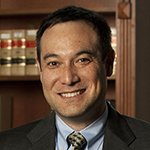Anti-abortion groups are well-known for demonstrating and sidewalk counseling at women’s reproductive health facilities, but a Massachusetts statute criminalizes even peaceful expression on public sidewalks near these clinics.
An upcoming U.S. Supreme Court case will determine the constitutionality of Massachusetts’ selective exclusion law, which applies only to streets and sidewalks near reproductive health-care facilities. The Massachusetts statute provides that “[n]o person shall knowingly enter or remain on a public way or sidewalk adjacent to a reproductive health-care facility within [specified distances around those facilities].”

“If Massachusetts can close off the sidewalks surrounding reproductive health centers to peaceful expressive activity, then the government can prohibit expression in a wide range of circumstances,” said John Inazu, JD, First Amendment expert and associate professor of law at Washington University in St. Louis.
Inazu advances his argument in an amicus brief filed on behalf of a broad coalition of religious groups, including the National Hispanic Christian Leadership Conference, International Society for Krishna Consciousness, Christian Legal Society, National Association of Evangelicals, InterVarsity Christian Fellowship, Christian Medical Association, Ethics & Religious Liberty Commission of the Southern Baptist Convention, Institutional Religious Freedom Alliance, Lutheran Church–Missouri Synod, and United States Conference of Catholic Bishops.
Inazu co-authored the brief with Michael W. McConnell, the Richard and Frances Mallery Professor of Law at Stanford Law School.
In their brief, Inazu and McConnell emphasize the “sheer magnitude of these restrictions,” noting that this statute criminalizes almost any use of the sidewalk near a reproductive health-care facility, including conversations between two willing participants or even a person singing or praying quietly to herself.
The brief argues that the Massachusetts law and a 2000 Supreme Court opinion upholding a similar Colorado law represent a breach of the public forum doctrine rooted in the First Amendment right to assembly.
“A state might seek to undermine union strikes by closing off public sidewalks surrounding factories to peaceful expressive activity. Or the state might seek to stifle criticism of a controversial legislative policy by excluding peaceful expressive activity from the public sidewalks near the state capitol … [T]hese regulations fundamentally undermine the public forum,” the brief states.
Inazu and McConnell emphasize that the state has the right to regulate the public forum if expression becomes violent because the Assembly Clause protects only peaceable assembly, but they argue the state does not have the right to ban public expression in order to avoid unpopular speech or expression.
Quoting from an earlier Supreme Court opinion, they conclude by noting “we apply the limitations of the Constitution with no fear that freedom to be intellectually and spiritually diverse, or even contrary, will disintegrate the social organization.”
The case involving the Massachusetts statute is McCullen v. Coakley. The court has not yet set a date for oral argument.